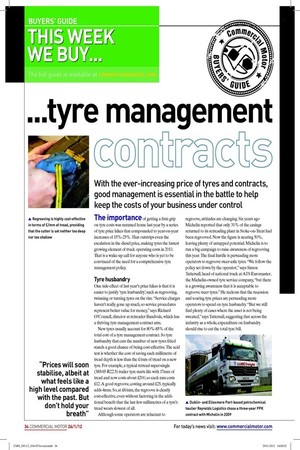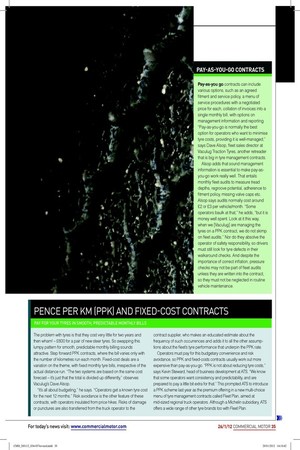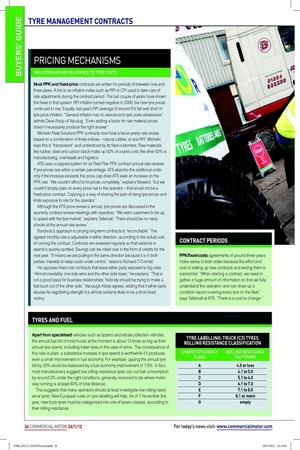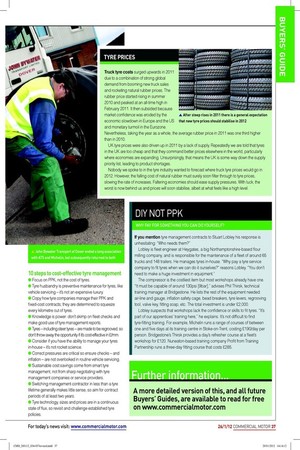THIS WEEK WE BUY...
Page 26

Page 27

Page 28

Page 29

If you've noticed an error in this article please click here to report it so we can fix it.
...tyre management
With the ever-increasing price of tyres and contracts, good management is essential in the battle to help keep the costs of your business under control
The importance of getting a irm grip
on tyre costs was rammed home last year by a series of tyre price hikes that compounded to year-on-year increases of 15%-25%. That outstrips even the escalation in the diesel price, making tyres the fastest growing element of truck operating costs in 2011. That is a wake-up call for anyone who is yet to be convinced of the need for a comprehensive tyre management policy.
Tyre husbandry
One side effect of last year’s price hikes is that it is easier to justify ‘tyre husbandry’, such as regrooving, twinning or turning tyres on the rim. “Service charges haven’t really gone up much, so service procedures represent better value for money,” says Richard O’Connell, director at retreader Bandvulc, which has a thriving tyre management contract arm.
New tyres usually account for 80%-85% of the total cost of a tyre management contract. So tyre husbandry that cuts the number of new tyres itted stands a good chance of being cost-effective. The acid test is whether the cost of saving each millimetre of tread depth is less than the £/mm of tread on a new tyre. For example, a typical retread super-single (385/65 R22.5) trailer tyre starts life with 17mm of tread and now costs about £200, so each mm costs £12. A good regroove, costing around £25, typically adds 4mm. So, at £6/mm, the regroove is clearly cost-effective, even without factoring in the additional beneit that the last few millimetres of a tyre’s tread wears slowest of all.
Although some operators are reluctant to regroove, attitudes are changing. Six years ago Michelin reported that only 31% of the casings returned to its retreading plant in Stoke-on-Trent had been regrooved. Now the igure is nearing 50%, leaving plenty of untapped potential. Michelin is to run a big campaign to raise awareness of regrooving this year. The inal hurdle is persuading more operators to regroove steer-axle tyres. “We follow the policy set down by the operator,” says Simon Tattersall, head of national truck at ATS Euromaster, the Michelin-owned tyre service company, “but there is a growing awareness that it is acceptable to regroove steer tyres.” He reckons that the recession and soaring tyre prices are persuading more operators to spend on tyre husbandry. “But we still ind plenty of cases where the asset is not being sweated,” says Tattersall, suggesting that across the industry as a whole, expenditure on husbandry should rise to cut the total tyre bill.
PAY-AS-YOU-GO CONTRACTS
Pay-as-you go contracts can include various options, such as an agreed fitment and service policy, a menu of service procedures with a negotiated price for each, collation of invoices into a single monthly bill, with options on management information and reporting. “Pay-as-you-go is normally the best option for operators who want to minimise tyre costs, providing it is well-managed,” says Dave Alsop, fleet sales director at Vaculug Traction Tyres, another retreader that is big in tyre management contracts.
Alsop adds that sound management information is essential to make pay-asyou-go work really well. That entails monthly fleet audits to measure tread depths, regroove potential, adherence to fitment policy, missing valve caps etc. Alsop says audits normally cost around £2 or £3 per vehicle/month. “Some operators baulk at that,” he adds, “but it is money well spent. Look at it this way, when we [Vaculug] are managing the tyres on a PPK contract, we do not skimp on fleet audits.” Nor do they absolve the operator of safety responsibility, so drivers must still look for tyre defects in their walkaround checks. And despite the importance of correct inflation, pressure checks may not be part of fleet audits unless they are written into the contract, so they must not be neglected in routine vehicle maintenance.
PENCE PER KM (PPK) AND FIXED-COST CONTRACTS
PAY FOR YOUR TYRES IN SMOOTH, PREDICTABLE MONTHLY BILLS The problem with tyres is that they cost very little for two years and then wham! – £600 for a pair of new steer tyres. So swapping this lumpy pattern for smooth, predictable monthly billing sounds attractive. Step forward PPK contracts, where the bill varies only with the number of kilometres run each month. Fixed-cost deals are a variation on the theme, with fixed monthly tyre bills, irrespective of the actual distance run. “The two systems are based on the same cost forecast – it’s just that the total is divided up differently,” observes Vaculug’s Dave Alsop.
“It’s all about budgeting,” he says. “Operators get a known tyre cost for the next 12 months.” Risk avoidance is the other feature of these contracts, with operators insulated from price hikes. Risks of damage or punctures are also transferred from the truck operator to the contract supplier, who makes an educated estimate about the frequency of such occurrences and adds it to all the other assumptions about the fleet’s tyre performance that underpin the PPK rate.
Operators must pay for this budgetary convenience and risk avoidance, so PPK and fixed-costs contracts usually work out more expensive than pay-as-you-go. “PPK is not about reducing tyre costs,” says Kevin Steward, head of business development at ATS. “We know that some operators want consistency and predictability, and are prepared to pay a little bit extra for that.” This prompted ATS to introduce a PPK scheme last year as the premium offering in a new multi-choice menu of tyre management contracts called Fleet Plan, aimed at mid-sized regional truck operators. Although a Michelin subsidiary, ATS offers a wide range of other tyre brands too with Fleet Plan.
PRICING MECHANISMS
INFLATION HAS NO RELEVANCE TO TYRE COSTS Most PPK and ワxed-price contracts are written for periods of between one and three years. A link to an inflation index such as RPI or CPI used to take care of rate adjustments during the contract period. The last couple of years have shown the flaws in that system. RPI inflation turned negative in 2009, but new tyre prices continued to rise. Equally, last year’s RPI average of around 5% fell well short of tyre price inflation. “General inflation has no relevance to tyre costs whatsoever,” admits Dave Alsop of Vaculug. “Even adding a factor for raw material prices doesn’t necessarily produce the right answer.” Michelin Fleet Solutions PPK contracts now have a twice-yearly rate review based on a combination of three indices – natural rubber, oil and RPI. Michelin says this is “transparent” and understood by its fleet customers. Raw materials like rubber, steel and carbon black make up 50% of a tyre’s cost; the other 50% is manufacturing, overheads and logistics.
ATS uses a capped system for its Fleet Plan PPK contract annual rate reviews. If tyre prices rise within a certain percentage, ATS absorbs the additional costs: only if the increase exceeds this price cap does ATS seek an increase on the PPK rate. “We couldn’t afford to fix prices completely,” explains Steward, “but we couldn’t simply pass on every price rise to the operator – that would not be a fixed-price contract. Capping is a way of sharing the pain of rising tyre prices and limits exposure to risk for the operator.” Although the ATS price review is annual, tyre prices are discussed in the quarterly contract review meetings with operators. “We want customers to be up to speed with the tyre market,” explains Tattersall. “There should be no nasty shocks at the annual rate review.” Bandvulc’s approach to pricing long-term contracts is “reconcilable”. The agreed monthly rate is adjustable in either direction, according to the actual cost of running the contract. Contracts are reviewed regularly so that variance in spend is quickly spotted. Savings can be rolled over in the form of credits for the next year. “It means we are pulling in the same direction because it is in both parties’ interests to keep costs under control,” reasons Richard O’Connell.
He opposes fixed-cost contracts that leave either party exposed to big risks. “Almost inevitably, one side wins and the other side loses,” he explains. “That is not a good basis for business relationships. Nobody should be trying to make a fast buck out of the other side.” Vaculug’s Alsop agrees, adding that if either party abuses its negotiating strength it is almost certainly likely to be a short-lived victory.
TYRES AND FUEL
Apart from specialised vehicles such as tippers and refuse collection vehicles, the annual fuel bill of most trucks at the moment is about 13 times as big as their annual tyre spend, including trailer tyres in the case of artics. The consequence of this ratio is plain: a substantial increase in tyre spend is worthwhile if it produces even a small improvement in fuel economy. For example, upping the annual tyre bill by 20% would be balanced by a fuel economy improvement of 1.5%. In fact, most manufacturers suggest low rolling-resistance tyres can cut fuel consumption by around 3% under the right conditions, generally reckoned to be where motorway running is at least 80% of total distance.
This suggests that many operators should at least investigate low rolling-resistance tyres. New European rules on tyre labelling will help. As of 1 November this year, new truck tyres must be categorised into one of seven classes, according to their rolling resistance.
CONTRACT PERIODS
PPK/ワxed-costs agreements of around three years make sense to both sides because the effort and cost of setting up new contracts and exiting them is substantial. “When starting a contract, we need to gather a huge amount of information so that we fully understand the operation and can draw up a condition report covering every tyre on the fleet,” says Tattersall at ATS. “There is a cost to change.”
10 steps to cost-effective tyre management
● Focus on PPK, not the cost of tyres.
● Tyre husbandry is preventive maintenance for tyres, like vehicle servicing – it’s not an expensive luxury.
● Copy how tyre companies manage their PPK and fixed-cost contracts; they are determined to squeeze every kilometre out of tyres.
● Knowledge is power: don’t skimp on fleet checks and make good use of tyre management reports.
● Tyres – including steer tyres – are made to be regrooved, so don’t throw away the opportunity if it’s cost-effective in £/mm.
● Consider if you have the ability to manage your tyres in-house – it’s not rocket science.
● Correct pressures are critical so ensure checks – and inflation – are not overlooked in routine vehicle servicing.
● Sustainable cost savings come from smart tyre management, not from sharp negotiating with tyre management companies or service providers.
● Switching management contractor in less than a tyre lifetime generally makes little sense, so aim for contract periods of at least two years.
● Tyre technology, sizes and prices are in a continuous state of flux, so revisit and challenge established tyre policies.
TYRE PRICES
Truck tyre costs surged upwards in 2011 due to a combination of strong global demand from booming new truck sales and rocketing natural rubber prices. The rubber price started rising in summer 2010 and peaked at an all-time high in February 2011. It then subsided because market confidence was eroded by the economic slowdown in Europe and the US and monetary turmoil in the Eurozone. Nevertheless, taking the year as a whole, the average rubber price in 2011 was one third higher than in 2010.
▲ After steep rises in 2011 there is a general expectation that new tyre prices should stabilise in 2012
UK tyre prices were also driven up in 2011 by a lack of supply. Repeatedly we are told that tyres in the UK are too cheap and that they command better prices elsewhere in the world, particularly where economies are expanding. Unsurprisingly, that means the UK is some way down the supply priority list, leading to product shortages.
Nobody we spoke to in the tyre industry wanted to forecast where truck tyre prices would go in 2012. However, the falling cost of natural rubber must surely soon filter through to tyre prices, slowing the rate of increases. Faltering economies should ease supply pressures. With luck, the worst is now behind us and prices will soon stabilise, albeit at what feels like a high level.
DIY NOT PPK
WHY PAY FOR SOMETHING YOU CAN DO YOURSELF?
If you mention tyre management contracts to Stuart Lobley his response is unhesitating: “Who needs them?” Lobley is fleet engineer at Heygates, a big Northamptonshire-based flour milling company, and is responsible for the maintenance of a fleet of around 65 trucks and 148 trailers. He manages tyres in-house. “Why pay a tyre service company to fit tyres when we can do it ourselves?” reasons Lobley. “You don’t need to make a huge investment in equipment.” The compressor is the costliest item but most workshops already have one. “It must be capable of around 130psi [9bar],” advises Phil Thirsk, technical training manager at Bridgestone. He lists the rest of the equipment needed: air-line and gauge, inflation safety cage, bead breakers, tyre levers, regrooving tool, valve key, fitting soap, etc. The total investment is under £2,000.
Lobley suspects that workshops lack the confidence or skills to fit tyres. “It’s part of our apprentices’ training here,” he explains. It’s not difficult to find tyre-fitting training. For example, Michelin runs a range of courses of between one and five days at its training centre in Stoke-on-Trent, costing £190/day per person. Bridgestone’s Thirsk provides a day’s refresher course at a fleet’s workshop for £120. Nuneaton-based training company Profit from Training Partnership runs a three-day fitting course that costs £285.
Further information...
A more detailed version of this, and all future Buyers’ Guides, are available to read for free on www.commercialmotor.com











































